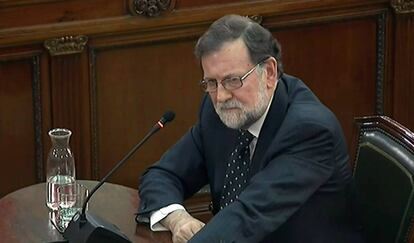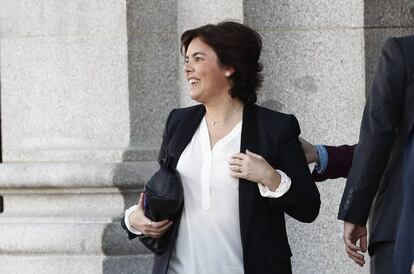Spain’s ex-PM Rajoy: “I do not negotiate sovereignty or national unity”
Several leading witnesses provided testimony at the trial of Catalan separatist leaders in Madrid

A referendum such as the one that took place in Catalonia on October 1, 2017 would have required prior constitutional reforms in order to be legal, said former Spanish government officials on Wednesday at the ongoing trial of Catalan separatist leaders in Madrid.
“They were fully aware that I was not going to call a referendum in violation of the law,” said former prime minister Mariano Rajoy, the star witness at a session packed with testimonies about the unauthorized referendum and the unilateral independence declaration that followed.“I do not negotiate sovereignty or national unity,” he added.
Authorizing a referendum is something that the government never lent itself to, and never must
Former Deputy PM Soraya Sáenz de Santamaría
Rajoy and other leading witnesses testified on Wednesday at the Supreme Court, which has already heard testimony from 12 defendants accused of crimes including disobedience, misuse of public funds, sedition and rebellion. The prosecution is seeking prison terms ranging from seven to 25 years for their role in organizing the unilateral secession attempt.
Rajoy, of the Popular Party (PP), says he told then-Catalan premier Artur Mas and his successor Carles Puigdemont that if they wanted to hold a referendum, they should discuss it inside Spain’s lower house of parliament, the Congress, rather than seek to reach a deal with the central executive.
“I told [Puigdemont] that the right thing to do was to come and defend whatever he considered convenient before the representatives of national sovereignty,” said Rajoy. “Spain is whatever [all] Spaniards, and not just some Spaniards, want it to be.

“I was really concerned. It was not a normal situation. I was worried that a regional government wanted to liquidate the Constitution. No head of government can accept the liquidation of the state,” said Rajoy about the decision his government took to temporarily suspend self-rule in Catalonia through the application of Article 155 of the Constitution. “Imagine if in a country like Germany, someone were allowed to simply do whatever they considered convenient, breaking up national sovereignty.”
Imagine if in a country like Germany, someone were allowed to simply do whatever they considered convenient
Ex-PM Mariano Rajoy
Speaking earlier in the day, his former deputy prime minister, Soraya Sáenz de Santamaría, also said that “if you want to hold a referendum, the Constitution needs to be reformed first. Authorizing a referendum is something that the government never lent itself to, and never must.”
The most serious accusation leveled against the defendants, rebellion, hinges on whether violence was employed at any point during the breakaway bid. Rajoy and Santamaría said there were acts of violence on September 20, 2017, when a crowd of thousands congregated outside the regional economic affairs building in Barcelona where the authorities were conducting a search.
Artur Mas

Earlier on Wednesday, the panel of seven justices heard witness testimony from Artur Mas, a former Catalan premier under whose leadership the pro-independence movement gained new traction at the height of the economic crisis.
Mas said that he suggested the idea of holding new regional elections to his successor Carles Puigdemont, but that the latter instead “altered the roadmap” by calling a referendum that would be viewed by the Catalan government as binding.
Mas, who was initially under investigation but had the charges against him dropped, is currently barred from holding office for organizing an earlier independence ballot on November 9, 2014 despite court warnings about its unconstitutionality. That vote was always regarded as non-binding.
As many as 20 politicians and high-ranking officials will testify as witnesses between Wednesday and Thursday at a trial that has been cast by the pro-independence movement as politically motivated, while the Spanish government has launched an international campaign to defend the impartiality of the Spanish judiciary.
English version by Susana Urra.
Tu suscripción se está usando en otro dispositivo
¿Quieres añadir otro usuario a tu suscripción?
Si continúas leyendo en este dispositivo, no se podrá leer en el otro.
FlechaTu suscripción se está usando en otro dispositivo y solo puedes acceder a EL PAÍS desde un dispositivo a la vez.
Si quieres compartir tu cuenta, cambia tu suscripción a la modalidad Premium, así podrás añadir otro usuario. Cada uno accederá con su propia cuenta de email, lo que os permitirá personalizar vuestra experiencia en EL PAÍS.
¿Tienes una suscripción de empresa? Accede aquí para contratar más cuentas.
En el caso de no saber quién está usando tu cuenta, te recomendamos cambiar tu contraseña aquí.
Si decides continuar compartiendo tu cuenta, este mensaje se mostrará en tu dispositivo y en el de la otra persona que está usando tu cuenta de forma indefinida, afectando a tu experiencia de lectura. Puedes consultar aquí los términos y condiciones de la suscripción digital.








































